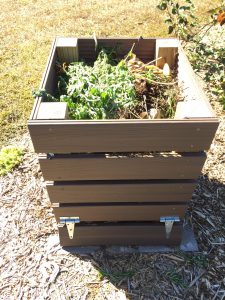Fall is the time of year many of us spend countless hours raking leaves and pine straw, piling them up, watching kids jump into the piles (then re-raking!), and bagging them up for disposal. However, what you may not have considered is that all of those materials are ideal fertilizer for your lawn and garden.
Composting is an excellent way to recycle yard waste, and now that leaves are dropping, you’ve got plenty of material to recycle. Vegetable gardens and landscapes alike can benefit from a generous dose of compost now and then. A free source of much-needed nutrients in our often nutrient-poor sandy soil, organic-rich compost also loosens tight, compacted soils and helps them hold nutrients and water.
So what is compost? Basically, compost is what’s left of organic matter after microbes have thoroughly decomposed it. Among the compostable organic materials available to most homeowners are leaves, grass clippings, twigs, chopped brush, straw, sawdust, vegetable plants, culled vegetables from the garden, fruit and vegetable peelings and coffee grounds (including the paper filter) from the kitchen. Don’t add table scraps with meats or oils to your compost pile—meats especially will attract animals. Contrary to popular opinion, compost piles don’t typically smell—but if you do have an odor come from decomposing vegetables, turning the compost pile and adding dirt, grass clippings or leaves will eliminate any smell.
The organisms that do the actual composting are bacteria and fungi are microscopic, although you will also find worms and arthropods in a good compost bin. A number of companies sell “composting microbes,” but you don’t need them. Fortunately, plenty of these microbes are around already. To get started, just mix a few scoops of garden soil or compost from a previous batch into the compost pile will provide all the microbes you need to start the process. The microbes just need water, oxygen and nutrients to grow and multiply.
Rainfall will provide most of the needed moisture. You may need to hand water the pile on occasion, too, during dry times. For best results, keep the pile moist but not soggy; if you pick up a handful it should not crumble away nor drip water when squeezed. The right mix of organic matter can provide all the nutrients needed. Alternate using brown (leaves, straw) and green materials (grass clippings, vegetables) in your compost bin to provide the needed amounts of carbon and nitrogen. If the pile seems to be decomposing too slowly, raise the nitrogen level by adding a few more green materials or a handful of granular fertilizer. And the more you turn the pile, the faster it will decompose.
There are many ways to contain your composting materials, from a simple pile to a solar-heated, rotating bin and everything in between. For more information on composting and compost bin options, please see this University of Florida Extension article.
- The Assassin Bug–A Beneficial Garden Visitor - January 15, 2026
- Wax Myrtle–a Native Evergreen - December 26, 2025
- Yucca–A Tough and Versatile Native Plant - November 26, 2025

